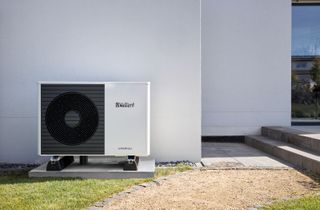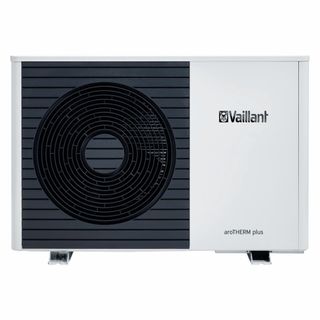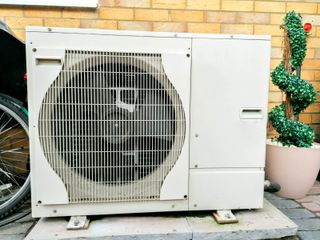Is R290 the solution to the F-gas problem? The heat pumps now using this non-toxic refrigerant
R290 is proving a more popular alternative to F-gas with companies increasingly using this in their heat pumps

A new solution to the F-gas problem is now sweeping across Europe with manufacturers switching to R290 as a refrigerant in heat pumps instead.
R290 propane refrigerant is becoming increasingly popular in air source heat pumps, especially in smaller capacity heat pumps used in residential and commercial applications. One of the main reasons for this is R290 is a more environmentally friendly compared to the refrigerants commonly used in heat pumps, such as R410A and R407C. Some heat pump manufacturers, such as Mitsubishi Electric, Daikin, and Vaillant have already started producing R290-based heat pumps for residential and commercial use.
Other manufacturers are also likely to follow this trend, as demand grows for a more environmentally friendly and energy-efficient heating and cooling solution.
What is R290 propane refrigerant?
R290 is a natural refrigerant that is also known as propane. Propane is classified as a hydrocarbon and is an effective refrigerant.
Propane has a number of properties that make it effective, including its low boiling point, which makes it easy to evaporate, and its ability to absorb heat quickly.
It is already commonly used in domestic refrigerators, freezers, and small commercial refrigeration systems.
Why is R290 environmentally friendly?
R290 is considered environmentally friendly because it has a very low impact on the environment.
Get the Homebuilding & Renovating Newsletter
Bring your dream home to life with expert advice, how to guides and design inspiration. Sign up for our newsletter and get two free tickets to a Homebuilding & Renovating Show near you.
R290 is a hydrocarbon refrigerant that has zero ozone depletion potential (ODP) and very low Global Warming Potential (GWP). The GWP of R290 is 3 whereas the current alternatives such as R410A and R407C are 675, proving that R290 is far more environmentally friendly than other refrigerants.
This means that it does not contribute to the ozone layer depletion or the greenhouse effects causing climate change.

Why is F-gas a problem for heat pumps?
F-gas (fluorinated gases) are synthetic greenhouse gases that cause significant environmental harm. They are currently commonly used as refrigerants in heat pumps, one of the only environmental factors holding heat pump technology back.
When F-gases, which include hydrofluorocarbon (HFCs), are released into the atmosphere, they can remain there for many years. Over time this can trap heat, contributing to an increase in global temperatures. This effect is much stronger than that of carbon dioxide, which is the most well-known greenhouse gas.
In addition to this, existing EU legislation aims to cut F-gas usage to a third of the amount used in 2015 by 2030, but is considering reducing this to 2025, prompting eco-friendly alternatives to emerge more quickly on the market.
If the EU does significantly reduce its F-gas usage quota to only 5% of the 2015 HFC usage by 2025 this could create shortages of refrigerants for heat pumps, placing increased pressure on manufacturers.
Graham Wright, former chairman of the Heat Pump Association, explained, "It isn't straight forward to swap out a gas with a different refrigerant. The heat pump industry is renowned for being innovative but it still takes time. There's a balance that needs to take place."

Is R290 safe?
Safety is an obvious concern as propane is a flammable gas, and as such requires special precautions when handling and using it as a refrigerant. This means more rigorous safety procedures and regulations need to be implemented when working with propane refrigeration systems.
However, David Hilton, an expert in sustainable buildings and energy efficiency, points out: "In a heat pump you’ve got a teapot full of propane. Whereas, every caravan park you go to has two 47kg bottles (of propane) which are massive. If we are prepared to have two of those outside our property then having a teapot full in a contained environment is not really going to be a problem."
“The only thing we have to look at with R290 is that propane in the form of R290 has no smell. That smell we have with gas has been put into it to make it smell. If you start putting those impurities into it, because of the way the refrigerants work it doesn’t like it, so if there is a leak you wouldn’t smell it. Those bits need to be managed."
"However, with a monobloc heat pump any leak would quickly dissipate into the air quite quickly and for it to ignite there would have to be a certain mix of propane to air, otherwise, it would not ignite. If it just leaks out, as long as it isn't near drains where it can become concentrated, it doesn’t always become an issue. So it is a challenge, but it is not insurmountable.”
Is R290 a viable alternative to F-gas for heat pumps?
R290 has many advantages over F-gas for heat pumps. Its environmental benefits are clear, however, the benefits don't end there.
R290 is a more energy-efficient refrigerant than F-gas, and is designed to function efficiently in colder climates as it can work in temperatures as low as -25°C and still produce heat ranging from 2kw to 24kw and hot water from 22C to 75C.
Additionally, it is compact and operates silently, making it suitable for residential purposes. The noise level ranges from 54 dB(A) to 59 dB(A) during the day and 46 dB(A) at night, about the same level as a dishwasher.
Overall, propane is a promising alternative to F-gases for heat pumps, and its use can help to reduce the environmental impact of these systems while providing effective heating and cooling.
R290 has not been widely adopted earlier due to the fact that most innovations are initially geared towards the commercial sector before trickling down to the residential market. However, because commercial applications would require a substantial amount of propane, it poses a significant safety hazard. Conversely, the quantity of propane required for residential properties is insufficient to mitigate the potential risk.
David adds: “For domestic problems and domestic heat pumps, personally I think R290 is a good solution. Especially if you’re using a monobloc heat pump."
“R290 wasn't really the low hanging fruit for the commercial market but if you start looking at the exhibitions and stuff now around Europe, everyone is going to R290.”

News Editor Joseph has previously written for Today’s Media and Chambers & Partners, focusing on news for conveyancers and industry professionals. Joseph has just started his own self build project, building his own home on his family’s farm with planning permission for a timber frame, three-bedroom house in a one-acre field. The foundation work has already begun and he hopes to have the home built in the next year. Prior to this he renovated his family's home as well as doing several DIY projects, including installing a shower, building sheds, and livestock fences and shelters for the farm’s animals. Outside of homebuilding, Joseph loves rugby and has written for Rugby World, the world’s largest rugby magazine.